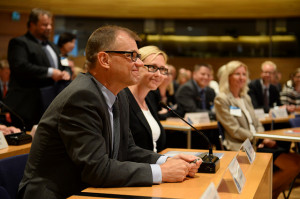Finland – the social contract to wreck the welfare state

Last week, over 30 000 people gathered in the centre of Helsinki, Finland to demonstrate against the Finnish Government’s labour market reforms and welfare cuts. For a country with less than 6 million people overall, that’s a pretty good turnout. Trains weren’t running, shops were empty, factories went quiet. This was the biggest strike Finland has faced in two decades.
Finland has a reputation as one of the beacons of social democracy in a laissez-faire world where a bunch of ranty Eton boys run one of the most powerful countries in the Europe, and Donald Trump might become President. We have the baby box, a solid welfare state and a society built on strong trade unionism. Our northern European haven is seen as such a good place to live, that we often describe being born there as equivalent to “winning the lottery”. This isn’t entirely untrue either – Finnish average net earnings are among the highest in Europe, with a single person without children making a salary of nearly 30,000 (EUR) per year.
The benefits of Finland’s social democratic tradition is widely recognised elsewhere. During the Scottish independence referendum campaign, the SNP and others reached out to become part of the Nordic club.
Finns are proud of this recognition – we see ourselves as a society where the collective works together to create a good life for everyone. If you asked most Finnish people what they think about David Cameron’s vicious cuts to housing benefit for young people or the attempts to curtail union rights, and the response would, until recently anyway, been one of horrified bemusement. “That would never happen in Finland”.
But it is happening. As of last May 2015, Finland has a new coalition Government composed of the centre-right agrarian party Keskusta, the neoliberal Kokoomus and an extreme right populist party, the True Finns. In a country with a number of mainstream left parties, and a tradition of coalition Government, it is rare for Finland to be led entirely by right-wing parties.
Now, we are getting fed the same story that’s been repeated around Europe over the past few years – the country’s economy is in crisis, we’ve lived beyond our means and we must pull together and make savings. And Finland is buying into it.
The new Prime Minister Juha Sipilä, a millionaire businessman with a friendly everyman persona, embarked on his reform programme with one clear goal – a 5% increase in productivity that would pull Finland out of deficit, give a boost to our export-oriented industries and put our country back into the race to the top.
Sipilä started his term with arms wide open for whole country to get on board his reform agenda. He wanted to make a new “social contract”, with employers, workers and the Government agreeing on labour market reforms that would improve productivity and cut back costs. After numerous failed attempts, the Government admitted a few weeks ago that it couldn’t bring the workers’ representatives on board. Sipilä then went on to decide that he didn’t care too much about his “social contract” after all, and was ready to push reforms through unilaterally, whether the unions liked it or not.
The reluctance of the workers’ unions to buy into the Government savings programme should hardly have come as a surprise to the Prime Minister. The Government believe that the 5% increase in productivity will be created by cutting back on unit production costs. And where else would you cut from but the cost of labour?
There are cuts to Sunday pay and pay for overtime; there is a proposal to reduce annual leave and to reduce employer contribution to national insurance; and there is a decision to make the first day of sick leave unwaged. All of this is coupled with harsh cuts to education, welfare and healthcare. Some might call it wrecking the Nordic model of society; others, like PM Sipilä, call it and attempt to save the Finnish welfare state.
As expected, a growing number of commentators are calling into question the basic rationale of the Government’s 5% productivity target. The focus on increasing productivity and competitiveness in export-oriented sectors seems odd when, as Left Alliance MP Anna Kontula recently pointed out, Finnish export industries already have lower wages than our European competitors. Union leaders are arguing that wage moderation exercised by the Finnish workforce over the past few years has already improved productivity, but this cut to costs for businesses has not resulted in more jobs. The Government’s claim that excessive labour costs are damaging our competitiveness doesn’t seem well-founded.
Criticism of Sipilä’s austerity strategy isn’t just coming from the political left either – economist and head of research at Helsinki University, Mika Pantzar, has pointed out that the Finnish economy is already in recovery. According to Pantzar, further cuts are simply not needed, and Finland should instead exercise neutral economic policy and allow for the growth to continue.
And yet, Friday’s demonstration has faced a huge wave of critique from the Government, from the employers’ representatives and from parts of the Finnish public. Those taking part in the walkout have been accused of holding the country back, shattering the economy and damaging Finland’s international reputation as a trusted business partner. Workers are accused of acting like spoilt kids, having lived the good life for too long.
Many seem persuaded by the Sipilä’s call for the country to pull together and make some sacrifices. After all, the number of holidays per year and the exact level of wages need to be determined somehow. Who is to say the proposed cut of Sunday pay to 175% isn’t a decent, proper level for the times we live in? Finns already have higher incomes and better terms and conditions than most people in this world – what’s all the fuss about?
Focusing on what constitutes a fair level of Sunday pay or benefits is, however, ignoring the real game-changer in Sipilä’s proposals. The big shock over the past few weeks has arguably not been the cuts themselves, even though they will hit many waged workers hard. The tipping point has been the shift in the balance of power in Finnish society.
For decades, terms and conditions in the Finnish labour market have been negotiated at national level, with the employers, workers and Government representatives around the same table. In this way, the three parties have arrived at “national income policy agreements”, which set practice on a large number of issues, ranging from wages and working hours to pensions and benefits. The agreements are voluntary, not legislative, but cover virtually all waged workers in the country. All parties have had to make compromises in negotiations, but that’s been the Finnish way.
Sipilä’s decision to forge ahead with reforms without consensus means that his Government will legislate on maximum benefits and wages and limit unions’ and employers’ ability to determine terms and conditions. An individual worker can still negotiate terms with their employer, but the big collective agreements Finland’s workers are used to cannot secure the workforce higher benefits than what the law dictates.
If Sipilä goes ahead and pushed through with his unilateral “social contract”, he will take a dangerous step away from the Finnish tradition of cooperation and into a realm where his Government are breaking internationally recognised labour rights.
Yes, you heard right. Finland, the beacon of social democracy in Europe, may soon come face to face with the EU and the ILO, as the new reforms may breech basic rights to collective bargaining which are set out in a number of international instruments and agreements that the country has ratified. The proposed restrictions to collective bargaining are unheard of in Finland – legal professionals have highlighted that there is no precedent to what Sipilä is proposing to do in Finnish history, or even in Europe. These are radical Government actions that will make fundamental changes to the way in which our politics operates.
So what happens to the social democratic light of Norther Europe, the collaborative, reasonable Finnish welfare state? Sipilä and his Government are starting to seem like they don’t want to play with anyone. They don’t want to give leeway to the unions; they don’t want to follow international rules that we’ve signed up to with (quite a few) other countries; and they most definitely don’t want to join the workers on the picket lines.
Unless Sipilä’s Government realise they need to return to the negotiating table, the myth of a country of socially minded team-players is looking increasingly frail.




Leave a Reply